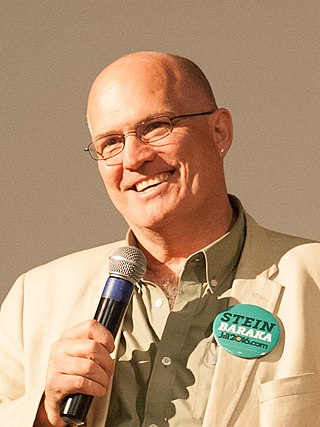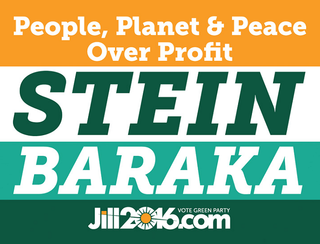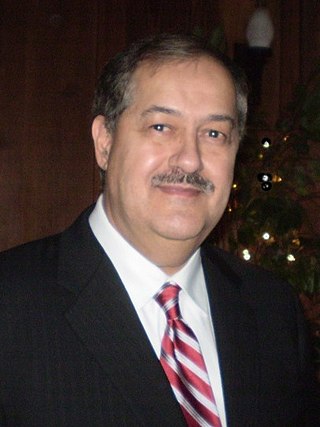
The Peace and Freedom Party (PFP) is a socialist political party in the United States which operates mostly in California. It was formed in 1966 from anti–Vietnam War and pro–civil rights movements.

David Keith Cobb is an American political activist who was the Green Party presidential candidate for the 2004 election. Cobb later became the campaign manager for fellow Green Jill Stein for her presidential run in 2016.

The 2008 presidential campaign of Cynthia McKinney, member of the U.S. House of Representatives from Georgia's 11th district (1993–97) and 4th district, began on December 16, 2007, as a candidate for the Green Party presidential nomination via YouTube. She and her running mate Rosa Clemente accepted the Green Party's presidential nomination July 12, 2008 at the 2008 Green National Convention. Her campaign focused on issues such as racial profiling, September 11, 2001 attacks, and the Green Party's 10 key values. She also supported statehood for the District of Columbia, slavery reparations, electoral reforms including instant runoff voting, and calls for abolishing the death penalty and the War on Drugs.
The Libertarian Party of the United States was formed in Colorado Springs in the home of Luke Zell by a group of individuals led by David Nolan on December 11, 1971, after several months of debate among members of the Committee to Form a Libertarian Party, founded July 17. The formation was prompted in part by price controls and the end of the Gold Standard implemented by President Richard Nixon. The Libertarian Party viewed the dominant Republican and Democratic parties as having diverged from what they viewed as the libertarian principles of the American Founding Fathers. This group included John Hospers, Edward Crane, Manuel Klausner, Murray Rothbard, Roy Childs, D. Frank Robinson, and Theodora (Tonie) Nathan.

Presidential elections were held in the United States on November 6, 2012. Incumbent Democratic President Barack Obama and his running mate, incumbent Vice President Joe Biden, were elected to a second term. They defeated the Republican ticket of former Governor of Massachusetts Mitt Romney and U.S. Representative Paul Ryan of Wisconsin, who later became Speaker of the House of Representatives.
The following is a timeline of major events leading up to the United States presidential election of 2012. The election was the 57th quadrennial United States presidential election held on November 6, 2012.
This article contains lists of official third-party and independent candidates associated with the 2012 United States presidential election.

The 2012 Green National Convention took place on July 12–15, 2012 in Baltimore, Maryland. The Annual National Meeting of the Green Party of the United States occurred at the University of Baltimore, with the National Convention on July 14 being held at the Holiday Inn Inner Harbor.

The 2012 United States presidential election in California took place on November 6, 2012, as part of the 2012 United States presidential election in which all 50 states plus the District of Columbia participated. California voters chose 55 electors, the most out of any state, to represent them in the Electoral College via a popular vote pitting incumbent Democratic President Barack Obama and his running mate, Vice President Joe Biden, against Republican challenger and former Massachusetts Governor Mitt Romney and his running mate, Congressman Paul Ryan.

The 2012 presidential campaign of Jill Stein was announced on October 24, 2011. Jill Stein, a physician from Massachusetts, gave indication in August 2011 that she was considering running for President of the United States with the Green Party in the 2012 national election. She wrote in a published questionnaire that she had been asked to run by a number of Green activists and felt compelled to consider the possibility after the U.S. debt-ceiling crisis which she called "the President's astounding attack on Social Security, Medicare and Medicaid – a betrayal of the public interest."

The 2016 Green National Convention, in which delegates of the Green Party of the United States chose the party's nominees for president and vice president in the national election, was held August 4–7, 2016 in Houston, Texas. In August 2015, Houston was chosen over a competing proposal from Toledo, Ohio. The convention was located at the University of Houston with the theme, "Houston, We Have A Solution: Vote Green 2016". The convention formally nominated Jill Stein as the party's presidential nominee and Ajamu Baraka as her running mate.

Jill Stein, a physician from Massachusetts, announced her entry into the 2016 United States presidential election on June 22, 2015. Stein had been the Green Party's presidential nominee in 2012, in which she received 469,627 votes. In the 2016 election, she once again secured the Green Party nomination and lost in the general election. She received 1.07% of the popular vote and no electoral college delegates.

The 2016 Libertarian Party presidential primaries and caucuses allowed electors to indicate non-binding preferences for the Libertarian Party's presidential candidate. These differed from the Republican or Democratic presidential primaries and caucuses in that they did not appoint delegates to represent a candidate at the party's convention to select the party's nominee for the United States presidential election. The party's nominee for the 2016 presidential election was chosen directly by registered delegates at the 2016 Libertarian National Convention, which ran from May 26 to 30, 2016. The delegates nominated former New Mexico governor Gary Johnson for president and former Massachusetts governor Bill Weld for vice president.

The 2016 United States presidential election in Illinois was held on Tuesday, November 8, 2016, as part of the 2016 United States presidential election in which all 50 states plus the District of Columbia participated. Illinois voters chose electors to represent them in the Electoral College via a popular vote, pitting the Republican Party's nominee, businessman Donald Trump, and running mate Indiana Governor Mike Pence against Democratic Party nominee, former Secretary of State Hillary Clinton, and her running mate Virginia Senator Tim Kaine. Illinois had 20 votes in the Electoral College.
A series of political debates were held between the Green candidates for president in the 2016 United States presidential election.

The Green Party of the United States held primaries in several states in 2012. Jill Stein won most of the primaries and was formally nominated as the party's nominee during the 2012 Green National Convention.

The 2020 Green Party presidential primaries were a series of primary elections, caucuses and state conventions in which voters elected delegates to represent a candidate for the Green Party's nominee for President of the United States at the 2020 Green National Convention. The primaries, were held in numerous U.S. states on various dates from early spring into early summer of 2020, and featured elections publicly funded, concurrent with the Democratic Party and Republican Party primaries, and elections privately funded by the Green Party, held non-concurrently with the major party primaries.

The 2020 Constitution Party presidential primaries were a series of primary elections determining the allocation of delegates in the selection of the Constitution Party's presidential nominee in the 2020 United States presidential election. On May 2, 2020, the Constitution Party nominated Don Blankenship for president and William Mohr for vice-president. Several state parties split from the national Constitution Party to nominate their own candidates.
This article lists third party and independent candidates, also jointly known as minor candidates, associated with the 2024 United States presidential election.
























